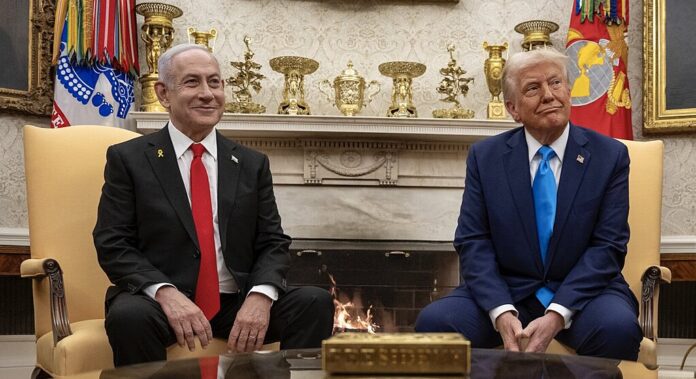Israeli PM lands in DC to discuss Gaza and Iran with Trump, but domestic turmoil shadows visit
Israeli Prime Minister Benjamin Netanyahu has touched down in Washington, D.C. for his third high-stakes visit under President Donald Trump’s current administration—this time, with hopes of brokering a long-elusive ceasefire deal in Gaza.
As Netanyahu entered the White House on Monday, flanked by Israeli and American flags, speculation swirled over whether his talks with Trump could mark a breakthrough in the months-long war in Gaza, which has claimed thousands of Palestinian lives and left southern Israel in a state of prolonged tension.
The visit comes during a politically fragile period for both leaders. For Trump, it’s a bid to demonstrate foreign policy strength ahead of key trade deadlines and rising domestic scrutiny. For Netanyahu, it’s a mission under the weight of internal revolt and growing international isolation.
According to US and Israeli officials, the pair will spend the week locked in meetings focused on Gaza, Iran’s regional posture, and expanding Israel’s diplomatic normalisation with Arab nations. But it’s Gaza that looms largest.
While neither side confirmed concrete progress, White House aides suggested that Trump will push Netanyahu to accept a phased ceasefire, with guarantees from regional partners and limited conditions placed on Hamas. In return, the US may support increased humanitarian aid and broader reconstruction funding, backed by Gulf states.
“There’s an urgency now,” said a senior US official. “This war is dragging on, and the humanitarian costs are mounting. The President wants to be the dealmaker—again.”
Netanyahu, however, faces searing criticism at home, both from Israel’s far-right and bereaved families of hostages still held in Gaza. Protests have erupted across Tel Aviv, demanding either a full ceasefire to save hostages or a total military victory—positions that have split his fragile coalition. Defense Minister Yoav Gallant has warned of long-term consequences if diplomacy is sidelined, urging the Prime Minister to “prioritise strategy over slogans.”
Embed from Getty ImagesMeanwhile, Trump is eyeing a potential legacy-defining moment. A ceasefire deal could revive his credentials as a regional power broker after his 2020 Abraham Accords win. But this time, the road is fraught with landmines. Critics say his transactional approach may not hold with parties as entrenched and ideologically divided as Israel and Hamas.
Sources close to the negotiations say Qatar, Egypt, and Jordan have been in regular contact with the White House in recent days, preparing to mediate if Netanyahu greenlights a framework. Trump has remained vague but bullish, telling reporters: “We’re closer than people think. If Bibi wants it, it’ll happen.”
Yet, “if” remains the operative word. Netanyahu must tread carefully. Any perception that he’s caving to external pressure could collapse his coalition. But so too could inaction. Polls in Israel show plummeting support for the Prime Minister as public patience with the Gaza campaign wears thin.
Outside the White House, Palestinian-American activists rallied, waving signs reading Ceasefire Now and Stop Arming Apartheid. Inside, aides said Trump had scheduled a private dinner with Netanyahu for Thursday—expected to be the make-or-break moment for any deal.
As the diplomatic clock ticks, the people of Gaza remain trapped in a humanitarian nightmare, and southern Israelis live under the daily threat of rocket fire. A breakthrough would offer respite—but few are betting on swift resolution.
For now, Netanyahu’s DC visit is equal parts diplomacy, damage control, and political theatre—with the lives of millions hanging in the balance.
